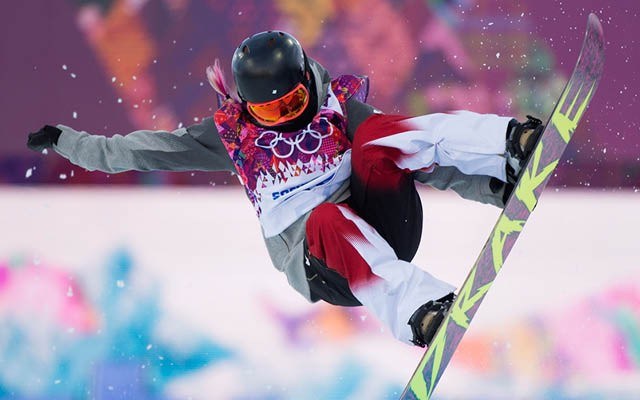Mercedes Nicoll already knew her body was in rough shape, but one of the first indications something wasn't quite right with her head came when returning to the top of the Sochi halfpipe.
After the Whistler snowboarder took a tumble and landed hard on her head, neck and shoulder in her Olympic practice session, she wanted to see if she was capable of competing. But when coach Dan Raymond cautioned her, Nicoll hurled expletives at him and ordered him out of the way.
"That's so not me to ever say that," Nicoll told Pique at a reception for local Olympians during the World Ski and Snowboard Festival. "I had to write an apology to him... it was the full-on angry side of the concussion."
The effects of that concussion, which weren't immediately apparent after her crash at the Games, have continued to plague Nicoll since she returned home from Sochi. So much so that the 30-year-old has only been back on a snowboard once.
"I didn't know it was that bad when it happened," said Nicoll, adding the concussion symptoms didn't become especially noticeable until her flight out of Russia.
"It was like I was going on the up-and-up, and then just took a drastic downfall."
Nicoll posted video of the crash to her Instagram account shortly after her competition ended, and it wasn't pretty. She landed on the coping of the pipe, which sent her tumbling over backwards, falling all the way to the transition before slamming into the ground.
On top of the concussion, she bruised her cheekbone and was left with a black eye that lasted for a month. Recent X-rays have determined that she also sustained tissue and ligament damage in her neck, with a couple of vertebrae a millimetre out of place.
Nicoll said she thinks the neck injury is only complicating her concussion symptoms, which have reduced over the past few weeks but still persist.
Initially, Nicoll didn't think she'd be able to ride before the end of the season unless "something miraculous" happened, but she did manage to go up for one run on Wednesday, April 30. She took just a few turns to see how she'd feel, and said it "put a massive smile on my face."
Although riding on Wednesday onset some of her symptoms, it was an encouraging sign, and there haven't been a lot of those for Nicoll since the Games.
"I just got my balance back," she said earlier in the month. "(But) I had to go to therapy because my eyes weren't tracking, so I'm allowed to drive now — I couldn't drive for a month.
"I just started working out again. I'm scrawny; I have no muscle. I've just been lying in bed because I'm exhausted."
And there have been mental challenges for Nicoll as well, as she's found it difficult to hold conversations with more than one person at a time. She also detailed how, early in the recovery process, she'd park her car at Marketplace for a physio appointment, then be unable to find her vehicle at the end of her hour-long session.
Nicoll said she's spoken with other athletes that have a concussion history who have been able to provide some good advice. But like any brain injury, the situation is different for everyone. Nicoll used fellow Whistler Olympian Yuki Tsubota as an example — Tsubota was knocked out in a crash in Sochi, suffering a concussion and requiring surgery on a fractured cheekbone. But Tsubota, whose concussion was her first, has been skiing for weeks. Nicoll, meanwhile, figures this was the "fourth or fifth" time she's been concussed.
"It's just a long recovery, and you don't have a timeline," Nicoll said at the Olympians' gathering. "People are asking me, 'When are you going to get better?' and I'm like, 'I'll tell you when I know.' It's been two months since I could finally come out and do (an event like) this, but I'll be exhausted; I'll take a nap after this."
Though she spent much of her time in Sochi after the crash recovering in her room, Nicoll said her third trip to the Olympics was a great experience, even if she is frustrated with how things played out in her competition. Shortly after the fall, she was eliminated from the first qualifying round and officially finished 25th.
"I watched, the other week, my practice runs before the fall and then (compared them to) my runs after," she said. "I'm embarrassed of my runs that everyone saw in the contest. But I think everyone that knows me knows that wasn't my potential."
Nicoll said she's hopeful to be back at full health in time for the 2014-15 competition schedule.




